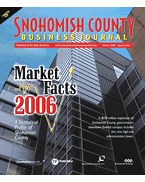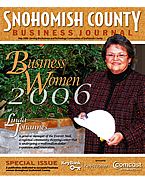 |
|
|
YOUR
COUNTY.
|
YOUR
BUSINESS JOURNAL.
|
Deadly
sins of media relations
— and why you should
avoid them
 The
most important thing to keep in mind about media relations is that business
periodicals, newspapers and broadcast media are in business to inform
and serve their readers and viewers. Your task is to share timely, newsworthy,
relevant, trendworthy and local story ideas for editorial consideration
that do exactly that.
The
most important thing to keep in mind about media relations is that business
periodicals, newspapers and broadcast media are in business to inform
and serve their readers and viewers. Your task is to share timely, newsworthy,
relevant, trendworthy and local story ideas for editorial consideration
that do exactly that.
In broad terms, reporters are interested in writing about:
n Breaking news that will impact their readers or viewers in a meaningful way.
n Emerging trends and their relevance in the local marketplace.
n Local examples of people and companies at the leading edge of these trends.
n Much-anticipated new products that have the potential to change the way we live, play and do business.
n Stories that touch our pocketbooks, our hearts, our minds — or that stop us in our tracks.
To serve these interests, offer news that reporters and editors can’t get anywhere else. Offer access to the deal makers and experts. Offer compelling visuals to bring the story to life. Offer proof of why your story is an example of a big trend gathering speed and why you are qualified to comment about it. Offer ideas that lend impact to special editorial sections. And, provide concise, quotable, thoughtful commentary that respects pressing deadlines.
As business owners, we know that attentive client service is an essential ingredient for successful and lasting relationships. The same is true when engaging in media relations. Reporters and editors are your most important customers because they have so much influence to share your stories with their audiences. Treat them with respect, honor their deadlines and other requests in a timely manner, and anticipate their needs as best you can.
Address reporters by name, and spell their names correctly. Be familiar enough with their work to know what will interest them. Make it easy for reporters to tell your story. Cover the “who, what, why, when, where and how” and, most importantly, “why” they should care. Make it easy for reporters to get in touch with you by phone and e-mail. And always ask if there is more you can do to be of service.
Now that you know what many editors and reporters are after, consider some of the deadly sins of media relations.
n Don’t ever say to a reporter, “I’m unfamiliar with your publication or your work.” These people work grueling hours against ongoing and demanding deadlines to serve their readers and viewers. You owe them the courtesy of your attention to their work. Without that, why should they pay attention to you?
n Don’t ever call reporters or editors and say, “Did you receive my press release?” This wastes their time and adds no value to the effort. Rather, call to say that new information has come to light since you issued that press release, and you are calling right away so the reporter can decide the best way to proceed. Take this approach provided that new information has truly come to light.
n Don’t ever say, “My firm buys a lot of advertising with your newspaper,” to imply that the publication owes you a story as a result. Advertising and editorial departments are treated separately at most quality media outlets.
n Don’t say, “I sent my press release to you last week” and ask, “When are you going to run it?” Good stories stand on their own merit. There are no guarantees for coverage.
n Don’t call reporters on deadline and expect them to be happy to hear from you.
n Don’t share information that hasn’t been spell-checked and double-checked for accuracy. That means checking phone numbers, names and addresses. The news business is all about accuracy and quality information. Don’t compromise on either.
n Don’t mistake “puff” for news. Always make it clear why readers or viewers should care. Without that crucial ingredient, you might as well just shell out for paid advertising.
n When asked for a quote, don’t blow it. A comment that starts with, “We are just so excited …”; “We are pleased ….”; or “We are delighted to be nominated …” takes up space without adding valuable content. When given the chance to say something, offer a strategic comment. Say something meaningful or memorable. Make your words count for something. And don’t make yourself sound like a cheerleader for the high school football team.
n Don’t send in an unflattering photo of yourself or your product and expect either to look better in newsprint. Newsprint is the unkindest paper of all. Hire a professional photographer to best represent your products and put your best face forward.
If you keep these deadly sins in mind and remember always to be of service to the reporters and editors you depend upon to share and deliver your news, you and your stories will be well served.
Nancy S. Juetten owns Nancy S. Juetten Marketing Inc., a public relations and marketing communications agency. She can be reached by calling 425-641-5214, by sending e-mail to nancy@nsjmktg.com or by going online to www.nsjmktg.com.













